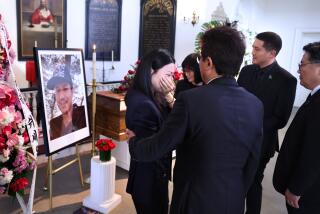Experts see signs of mental disorders in gunman’s videotape
- Share via
A persecution complex. Paranoid schizophrenia. Psychotic depression, with both homicidal and suicidal characteristics. Severe bipolar disorder.
Though no one can now diagnose Virginia Tech gunman Seung-Hui Cho, mental health experts who watched his videotaped message about Monday’s rampage say there was evidence of all of those mental disorders.
His desire to kill others as well as himself is “not an unusual combination for a school shooter,” said Dr. Marleen Wong, director of crisis counseling for the Los Angeles Unified School District and of a trauma studies unit at the National Center for Child Traumatic Stress.
Nor, Wong said, were his “clear delusions of persecution” unusual in such cases. The 23-year-old, Wong said, “doesn’t appear, from what we know, to have had enough interaction with other people to actually be persecuted. But there’s no doubt that he believed he was.”
But experts said none of the possible mental disorders could fully explain what drove him to carry out the assault.
“We don’t know exactly what was going on with this guy,” said Patrick Tolan, director of the Institute for Juvenile Research at the University of Illinois Medical School in Chicago “But what’s really important to note is that most people with these sorts of disorders would never actually do anything like this.”
Tolan, an expert on adolescent violence and prevention strategies, said that though some mass murderers speak only by their violence, Cho fell into the category of those who wanted to explain their actions to the world.
“There are really two main possibilities for what was going through his mind” when he took photographs and made a video of himself and then mailed them to NBC, Tolan said.
“One would be, for people in these kinds of states, it’s often an attempt to reach out,” said Tolan. “They’re really asking, ‘Can somebody out there understand me? Can somebody understand why I feel the way I do?’
“Then the other part of it is that if they have a delusional sense of their importance, the idea of this tape might be to somehow create some sense of organization for what they are going to do, a hope that it will somehow bring about justice for this terrible thing done to them,” Tolan said.
In his rambling account, Cho likened himself to Christ and blamed his woes -- and his violent acts -- on the “sadistic snobs” who had “vandalized my heart, raped my soul and torched my conscience.”
The tape “vividly shows how completely out of touch he was,” said Martin H. Williams, a psychologist in San Jose who testfies on defendants’ competency to stand trial. “He really does seem to expect that if people watch what he has to say, they will fully understand why he was forced to take this extreme action.”
Williams said the tape showed similarities to the ramblings of Charles Manson. Unlike Manson, though, Cho appears to have had no ability or inclination to organize or inspire followers.
“It sounds to me like the theme here is he felt he was being persecuted by powerful people who were hurting him greatly.... But what we don’t know is if this kid was hearing voices, voices telling him to act.”
*
Times staff writer Lynn Marshall contributed to this report.
More to Read
Sign up for Essential California
The most important California stories and recommendations in your inbox every morning.
You may occasionally receive promotional content from the Los Angeles Times.













